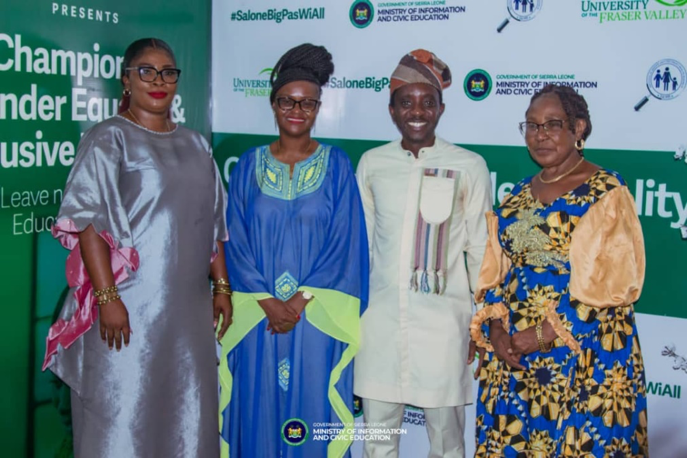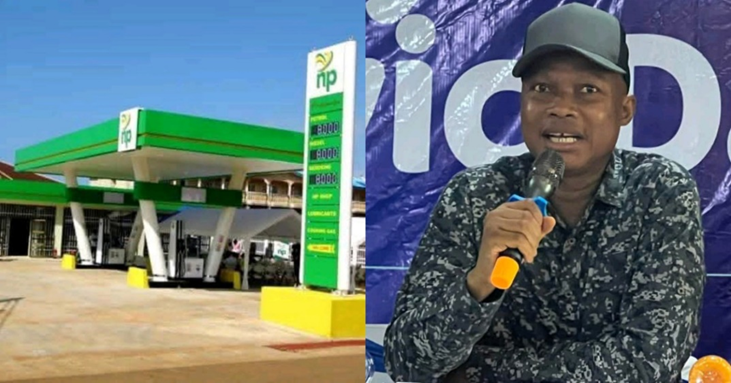By Mariama Bundu
In a powerful affirmation of the national commitment to education for all, the Government of Sierra Leone, in partnership with the University of the Fraser Valley in Canada, convened a landmark dialogue under the theme “Leave No One Behind – Education is a Right”. Held at the Miatta Conference Centre in Freetown, the event brought together senior government officials, civil society leaders, students, international researchers, persons with disabilities, and youth activists to push for inclusive, equitable access to education across the country.
Spearheaded by the Ministry of Information and Civic Education, the dialogue aimed to deepen public understanding and political commitment around inclusive education—particularly for marginalized populations such as girls, children in rural communities, and young persons with disabilities.
Minister of Information and Civic Education, Chernoh Bah—widely known as Ceebah—delivered opening remarks that emphasized the transformative leadership of President Julius Maada Bio on radical inclusion in education.
“President Bio did not just change his mind—he became a global champion for radical inclusion,” said Minister Bah. “His leadership has opened school doors to pregnant girls, children with disabilities, and the underserved. This is not just reform; it is a movement to democratize opportunity.”
Minister Bah emphasized the importance of public awareness in sustaining educational reforms and praised the Radical Inclusion Policy as a revolutionary blueprint for ensuring no child is left behind due to stigma, disability, gender, or location.
Minister of Gender and Children’s Affairs, Isata Mahoi, delivered one of the most heartfelt speeches of the event, reflecting on her own experiences growing up in rural Sierra Leone and the weight of her current responsibilities.
“Sometimes I feel there is a heavy burden on me,” she said, her voice heavy with emotion. “If I wake up one morning and see there is no more suffering for children, I would be the happiest person in the world.”
Minister Mahoi emphasized the interconnection between Sierra Leone’s education reforms and global goals, particularly the United Nations Sustainable Development Goals (SDGs) 4 and 5, which focus on quality education and gender equality, respectively. She cited the Gender Equality and Women’s Empowerment (GEWE) Act and the Radical Inclusion Policy as national commitments to creating a more just and accessible educational system.
International partner Catherine Liao, project manager and researcher at the University of the Fraser Valley, provided insights from an ongoing project supporting inclusive education in Bombali and Tonkolili districts. Initiated in 2021 through a partnership with the Albinism Royal Foundation, the project is focused on promoting gender-responsive education for children with disabilities, especially girls.
“Our goal is to ensure that the right to education becomes a lived reality, not a distant promise,” said Liao. “Through youth-led Saturday clubs, community mentorship, and rights-based education, we are fostering leadership and challenging deeply rooted gender norms.”
Liao explained that the project, funded by Global Affairs Canada, includes vocational skills training, the development of community education charters, and awareness-building initiatives that seek to transform mindsets around disability and girl-child education.
Minister of Technical and Higher Education, Dr. Ramatulai Wurie, offered a policy-oriented perspective on the conversation, reminding attendees of the power of legislation and political will in shaping access to education.
“Policy is not just paperwork—policy is power,” she said. “It defines who gets to learn and who is excluded. It determines whether education transforms lives or deepens inequality.”
She acknowledged the role of the New Direction agenda in prioritizing human capital development and cited flagship reforms such as the Free Quality School Education (FQSE) initiative and the GEWE Act as major steps toward educational equity. However, she was quick to caution that policies must not remain theoretical.
“We must ensure our policies are reflected in budgets, school buildings, teacher training, and community norms,” Dr. Wurie emphasized. “Real inclusion happens when policy meets people.”
She further shared findings from a post-Ebola study in Sierra Leone that revealed a frequent disconnect between well-intentioned gender-sensitive policies and how they are implemented on the ground. This, she argued, underscores the need for participatory policy-making.
“We need to stop designing policies for people and start designing them with people,” she said. “That is how we ensure true ownership, sustainability, and impact.”
Throughout the dialogue, civil society organizations and youth representatives echoed the need for stronger partnerships, consistent government funding, and ongoing public engagement to eliminate barriers to learning. The event ended with a call for a unified national effort to create an education system where no child is denied the opportunity to learn, grow, and thrive.
As Sierra Leone continues to position itself as a leader in inclusive education on the African continent, the message from the Miatta Conference Centre was clear: education is not a privilege for a few—it is a right for all.



